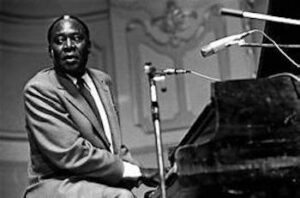
Memphis Slim
*Memphis Slim was born on this date in 1915. He was a Black blues pianist, Singer, and composer.
Memphis Slim was born John Len Chatman in Memphis, Tennessee. For his first recordings, for Okeh Records in 1940, he used the name of his father, Peter Chatman (who sang, played piano and guitar, and operated juke joints); he did so to honor his father. Later that year, he started performing under the name "Memphis Slim" but continued publishing songs under Peter Chatman. He spent most of the 1930s performing in honky-tonks, dance halls, and gambling joints in West Memphis, Arkansas, and southeast Missouri.
He settled in Chicago in 1939 and began teaming with the guitarist and Singer Big Bill Broonzy in clubs. In 1940 and 1941, he recorded two songs for Bluebird Records, "Beer Drinking Woman" and "Grinder Man Blues." These were released under the name "Memphis Slim," given to him by Bluebird's producer, Lester Melrose. Slim became a regular session musician for John Lee "Sonny Boy" Williamson, Washboard Sam, and Jazz Gillum.
After World War II, Slim began leading bands with saxophones, bass, drums, and piano, reflecting the popular appeal of jump blues. In late 1945, he recorded with trios for the small Chicago-based Hy-Tone Records. With a lineup of alto saxophone, tenor sax, piano, and string bass, he signed with the Miracle label in the fall of 1946. One of the songs recorded at the first session was the ebullient boogie "Rockin' the House," from which his band would take its name. Slim and the House Rockers primarily recorded for Miracle through 1949, achieving some commercial success.
In 1947, the folklorist Alan Lomax brought Slim, Broonzy, and Williamson to the Decca Records studios and recorded with Slim on vocal and piano. Lomax presented sections of this recording on BBC Radio in the early 1950s as a documentary, The Art of the Negro, and later released an expanded version as the LP Blues in the Mississippi Night. In 1949, Slim expanded his combo to a quintet by adding a drummer; the group toured in Cincinnati and Houston.
One of his 1947 recordings for Miracle, released in 1949, was "Every Day I Have the Blues." The song was recorded by numerous other artists, from B. B. King, Elmore James, and Natalie Cole to Sarah Vaughan, Carlos Santana, and Lou Rawls. Joe Williams recorded it in 1952; his remake from 1956 (included on the album Count Basie Swings, Joe Williams Sings) was in the Grammy Hall of Fame in 1992.
After 1954, Slim did not have a steady relationship with a record company until 1958, when he signed with Vee-Jay Records. In 1959, Willie Dixon's debut album, Willie's Blues, was released. As Dixon's piano accompanist, Slim was given almost equal credit on the album. Memphis Slim played on all the tracks and wrote the two numbers that Dixon did not pen. Slim first appeared outside the United States in 1960, touring with Willie Dixon, with whom he returned to Europe in 1962 as a featured artist in the first of a series of American Folk Festival concerts organized by Dixon, which brought many notable blues artists to Europe in the 1960s and 1970s. The duo released several albums together on Folkways Records, including Memphis Slim and Willie Dixon at the Village Gate with Pete Seeger (1962).
In 1962, Slim moved permanently to Paris, and his engaging personality and well-honed presentation of playing, singing, and storytelling about the blues secured his position as one of the most prominent blues artists for nearly three decades. He appeared on television in numerous European countries, acted in several French films, wrote the score for À nous deux France (1970), and performed regularly in Paris, throughout Europe, and on return visits to the United States. Two years before his death, Slim was named a Commander in the Ordre des Arts et des Lettres by the Ministry of Culture of the Republic of France. In addition, the U.S. Senate honored Slim with the title of Ambassador-at-Large of Goodwill. He made over 500 recordings. Memphis Slim died in Paris on February 24, 1988, at 72. He is buried at Galilee Memorial Gardens in Memphis, Tennessee, and was inducted into the Blues Hall of Fame in 1989.